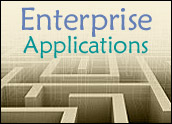
Kudos to all those who participated in, organized or even attended the Enterprise 2.0 conference in drizzly Boston last week. There is a lot to write about.
The big ideas that I took away include disruption and evolution, ROI and a need to sharpen our focus. Here are a few thoughts on a very good show.
Disruption and Evolution
The Tuesday keynotes generated needless confusion by asking a simple question: Is Enterprise 2.0 a revolution or an evolution? Such a question is often resolved in a cowardly compromise to split the difference. As they used to say on SNL, “It’s a floor wax and a dessert topping!”
But not so fast. In this case, splitting the difference by saying it’s both is not far off the mark. It is both revolution and evolution, but only because some people prefer to see a difference between the two. In fact, evolution experts might tell you that the two are part of the same continuum. They even have a name for it: punctuated equilibrium. Enterprise 2.0 is a revolution (punctuation) made possible by years of stealthy evolution (equilibrium) — small changes with incremental effects that, with critical mass, result in the revolution we see.
Many of the sessions I attended struck that tone. One of the best was “Networked: How the 2.0 Enterprise Makes Itself Transparent, Participatory and Collaborative,” by the husband and wife team of Jessica Lipnack and Jeff Stamps from Netage.
The thought that sticks with me though is how hard it is to achieve punctuation as time goes on. Entrenched interests from the last revolution draw a lesson from their own success and work to prevent the same disruption from happening to them. Look at Iran, for example. No more street protests, thank you very much.
A good point made at a keynote by Matthew Fraser co-author of Throwing Sheep in the Boardroom, is that the enterprise phase of Enterprise 2.0 failed to ignite because entrenched, hierarchical interests in corporations successfully thwarted it. The social networking revolution, which started at the grass roots, is the result. The question to be answered is now less whether but how social networking and social media will scale corporate walls.
ROI Is Not Important
I just love this one because I am a disruptive thinker, and showing the ROI analysis for me is like having to be constantly reminded to say “please” and “thank you” and to put my toys away. Your pants are on fire — do I really need to say, “Pardon the interruption,” before I get the extinguisher? Sheesh!
I am back.
Stowe Boyd, CEO, Edglings, said it best. It’s not that ROI is unimportant — many people in enterprises around the world would violently agree with that. However, there are certain times when ROI may be irrelevant, or at least an irrelevant barrier. That time is during a paradigm shift or revolution cited above — we are in an “ROI is not important” era all of a sudden.
A real paradigm shift happens quickly, and when it does, it wipes out what stood for business as usual and replaces it with something new. For example, an asteroid hit this planet about 65 million years ago and wiped out most of the dinosaurs. (I say most because there are scientists who think that birds are their direct descendants, and who am I to dicker?) The asteroid was not the paradigm shift, but it caused one, and the shift took many millions of years to fully roll out. However, it was the primary cause that made dinosaurs irrelevant and mammals ascendant.
In business, change is more rapid and usually less violent, but paradigms nonetheless shift dramatically. We are the mammals of earlier shifts. Boyd gave the example that after World War II, the major shift was to place a telephone on each employee’s desk. No one at the time could produce an ROI analysis that would provide the justification, and many people worried that the phones would be abused for personal use (sound familiar?), but the shift proceeded. It was unstoppable, and today we couldn’t imagine a time when a phone was optional or reserved for a chosen few.
Boyd’s point was that placing the phones on desks was so important, such a game changer, that few people waited for the ROI analysis before beginning deployments. Of course there were laggards, but history does not record their names. We could trace the same trajectory through such radical deployments as typewriters, mimeo machines, copiers, faxes and, in our time, PCs. It took about a decade before the full productivity of having a PC on nearly everyone’s desk produced the significant change (punctuated equilibrium again) that seemingly overnight produced one of the greatest productivity bursts in history.
Let’s Sharpen Our Focus
It’s fine to tout the importance of the social revolution taking place right now, the end-point of which is Enterprise 2.0, but there’s still a lot of work to do. The greatest challenge is to accept the paradigm shift for what it is and not some kind of extension of an earlier paradigm. We see paradigm extension all the time in the cut-over from one paradigm to another. The old paradigm adopts some aspects of the new in an effort to forestall change. We see it right now in the silly argument about Software as a Service (SaaS) and multi-tenancy’s centrality to it all.
At the recent Sales 2.0 conference, also held in Boston, I got a whiff of paradigm extension from most vendors still confused about social media’s centrality and purpose. Social media is not a way to turbo charge your spamming efforts or to round up more low-grade suspects for your pipeline. Sales and a lot else needs to look at social media with open eyes and a minimum of pre-judgment if we are to be successful in bringing Enterprise 2.0 to life.
So there, in a large nutshell, is my first cut at what happened in Boston last week. Despite the rain, Boston was — and remains — a good place to start a revolution.
Denis Pombriant is the managing principal of the Beagle Research Group, a CRM market research firm and consultancy. Pombriant’s research concentrates on evolving product ideas and emerging companies in the sales, marketing and call center disciplines. His research is freely distributed through a blog and Web site. He is working on a book and can be reached at [email protected].























































Great article. There was definitely a lot going on at Enterprise 2.0. I think part of the reason for the "slower" adoption of social media is that people have to change their behavior to adopt it. Boyd’s example of the telephone illustrates how people can understand the value of not having to leave one’s desk to talk to someone. It’s a good example of understanding ROI without lengthy analysis. I’m pretty sure corporate citizens will eventually take advantage of social media but it does require that they change the way they work. That alone will make C-level executives ask for an ROI analysis. As for the telephone, we (humans) always spoke. The telephone just made it so that we didn’t have to get up to do so.